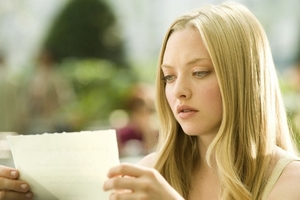Mark:
Say what you like about its sappy plotlines and ending that can be seen all the way from the queue to buy popcorn, Letters to Juliet is a competently made crowd-pleaser.
Sophie (Amanda Seyfried) is a writer who works for The New Yorker magazine as a fact-checker because her boss can’t see the obvious journalistic talent bursting from her every pore. When she and her fiance – Gael García Bernal as chef and would-be restaurateur Victor – travel to Verona for a ‘pre-honeymoon’, Sophie will find herself drawn to the plight of the many tearful women who post notes to Juliet on the wall below the balcony that apocryphally belonged to Shakespeare’s most famous heroine. When she responds to one of these letters she might just cause the reunion of long-lost lovers after fifty years apart.
When she and her fiance – Gael García Bernal as chef and would-be restaurateur Victor – travel to Verona for a ‘pre-honeymoon’, Sophie will find herself drawn to the plight of the many tearful women who post notes to Juliet on the wall below the balcony that apocryphally belonged to Shakespeare’s most famous heroine. When she responds to one of these letters she might just cause the reunion of long-lost lovers after fifty years apart.
Letters to Juliet bases any and all of its success on the strength of its two lead female characters: Vanessa Redgrave joins Seyfried to form a mightily pleasing and heartwarming relationship between a young woman who never really knew her mother and an older one who wishes she had the romantic courage of her younger counterpart. Redgrave simply shines in her performance, and may truly move her audience with her gentle, cheeky, fragile creation. Seyfried has had success in awful films like Mamma Mia! and Jennifer’s Body – in the latter she is almost the only worthwhile thing about it – and again she appears to be greater than the material she is working with here.
The difficulties start, as is so frequently the case in romantic comedies and straight romance films alike, with the male leads. Victor is a git, and it is nigh on impossible to believe he and Sophie would ever hit it off, much less date, or worse still, become engaged. That it takes her so long to discover his stunning disinterest in his bride-to-be does not sit with the intelligent and independent woman Sophie is supposed to be. Charlie (Christopher Egan), meanwhile, starts out completely unlikeable in the way that audiences by now must be expecting, and, well, he just never really becomes anything else. It’s not that he’s not written to be a charming, dashing hero to sweep up our heroine and live happily ever after; it’s really that Egan just doesn’t pull it off. Sophie’s distaste for her opposite number morphs very quickly into something else, and without any discernible reason that can explain this sudden and never even remotely believable turn of events.
The setting – Verona, and surrounding Italian countryside filled with wineries and farmlands – is simply wonderful, and almost worth paying the admission just to watch in the background. Unfortunately, the film drags in parts and doesn’t quite maintain the energy that Redgrave, Seyfried and Italy itself generate. When making a film that is knowingly going to hit every predictable marker on the way to its inevitable romantic conclusion, it pays to ensure the audience isn’t given much chance to note they’ve seen your film may times before.
Despite the trailer threatening to ruin the film by spoiling any (albeit remote) chance it had at being unexpected, Letters to Juliet manages to overcome its limitations and remain a moderately enjoyable romance. That Seyfried and, particularly, Redgrave are just so darn easy to watch makes it a much more worthwhile experience than might be foreseen.
Rating: